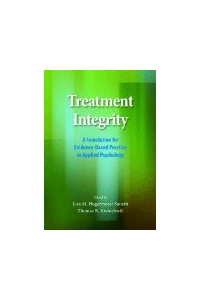“Treatment Integrity: A Foundation for Evidence-Based Practice in Applied Psychology”

“Treatment Integrity: A Foundation for Evidence-Based Practice in Applied Psychology”
Edited by Lisa M. Hagermoser Sanetti and Thomas R. Kratochwill
American Psychological Association
Washington, D.C., 2014
Hands-on approach makes book appealing
Reviewed by James K. Luiselli, Ed.D., ABPP, BCBA-D
Treatment integrity refers to the accuracy of procedural implementation by service providers. If practitioners such as clinicians, teachers and paraprofessional staff apply interventions inconsistently, it is not possible to properly assess whether treatment failure or less than desirable outcome is because of poor implementation or the procedures themselves. Of note, questionable treatment integrity almost always leads to sub-optimal results for service recipients.
The importance of evaluating and improving treatment integrity is widely recognized within the broader field of implementation science, by which research findings are translated into routine practice. However, the concern about treatment integrity has evolved slowly, albeit with greater awareness and inquiry in recent years. Thankfully, we now have this edited book by Hagermoser Sanetti and Kratochwill, in their words, “to provide the first comprehensive source of the current state of knowledge related to the conceptualization, assessment and promotion of treatment integrity across psychology, education and related fields.”
Each of the four sections in the book contains three chapters that advance our understanding of treatment integrity within multiple disciplines. Section I addresses different conceptual models of treatment integrity, emphasizing seminal developments among the medical professions and subsequent evolution within the social sciences. These chapters also preview some of the methods for enhancing and maintaining treatment integrity that are presented in more detail later in the book.
The chapters in Section II thoroughly explain the process of assessing treatment integrity. In addition to describing distinct techniques, these chapters examine organizational influences that can both facilitate as well as impede assessment objectives. Readers will also find valuable the many recommendations for analyzing and interpreting treatment integrity data – without such analyses assessment efforts fall short and do not contribute to better implementation.
Section III offers outstanding suggestions for promoting treatment integrity through performance feedback to practitioners. Most performance based research has been conducted in educational settings and human services organizations but the procedures are equally suitable to other treatment venues. Some of the topics in this section are preparing practitioners for strategic initiatives to enhance their treatment integrity and the many contributions applied behavior analysis has made to this endeavor.
Lastly, Section IV highlights legal and ethical issues related to treatment integrity, the matter of treatment integrity within conjoint behavioral consultation, and integrating treatment integrity at the level of community-oriented prevention programs. This section is welcome because it expands on earlier chapters and considers several unifying concepts and applications.
This book gives students, trainees, and professionals a one-of-a-kind resource that captures the most vital information on treatment integrity available in the contemporary literature. The editors clearly achieved their intended goals of accelerating treatment integrity practice and research by compiling a substantive knowledge base, describing evidence-based techniques and aggregating the most persuasive empirical findings. With “hands on” appeal and heuristic value, the book will educate any interested reader about the merits of treatment integrity for developing exemplary practice standards and producing the best results with the people we serve.
James K. Luiselli, Ed.D., ABPP, BCBA-D, is Chief Clinical Officer, Clinical Solutions, Inc. and North East Educational and Developmental Support Center, Tewksbury, Mass.
Learn more about the book: Treatment Integrity: A Foundation for Evidence-Based Practice in Applied Psychology (School Psychology Book)
